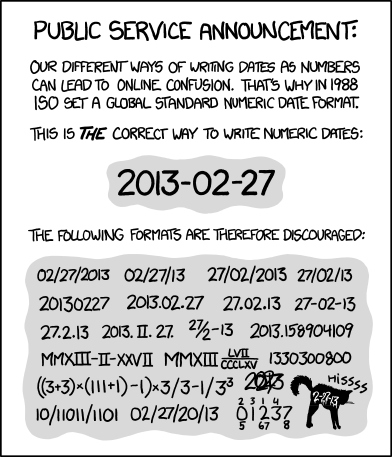ISO 8601 for Programmers
April 7th 2016I came across a nice article on ISO 8601 and thought I would share it here and expand on it some.

- date:
%Y-%m-%dor%Ffor recent implementations (example: 2013-12-31) - time:
%H:%M:%Sor%Tfor recent implementations (example: 10:10:10)
However time should always include a timezone. In the simple case, where the time is in UTC you can simply add a Z to the end of the time %TZ.
If you want to represent a particular point in time you can use %FT%T%z.
On a modern posix system you should see output similar to 2016-04-07T04:44:30+0200.
In Ruby you can execute puts Time.now().strftime("%FT%T%z").
In C/C++ you can compile:
#include <time.h>
#include <stdio.h>
int
main()
{
time_t t;
struct tm *tmp;
char buffer[51];
t = time(NULL);
tmp = localtime(&t);
strftime(buffer, sizeof(buffer), "%FT%T%z", tmp);
printf("%s\n", buffer);
return 0;
}
There is also a standard for Durations.